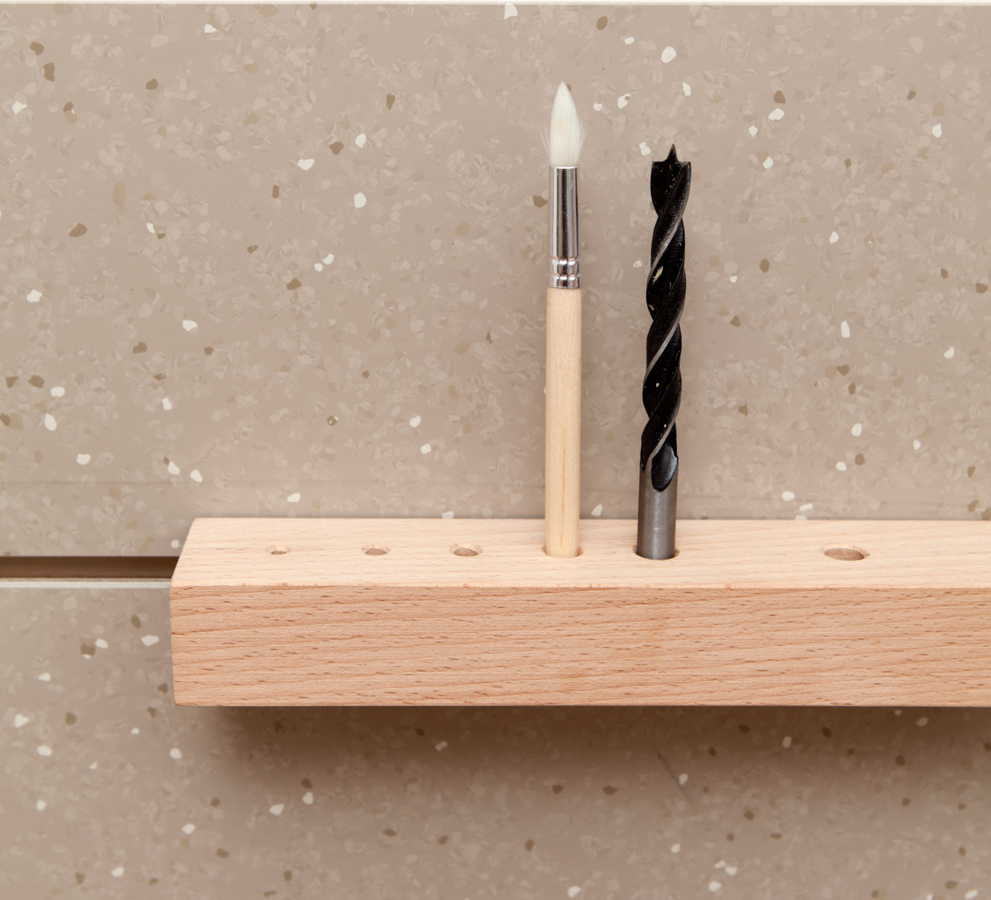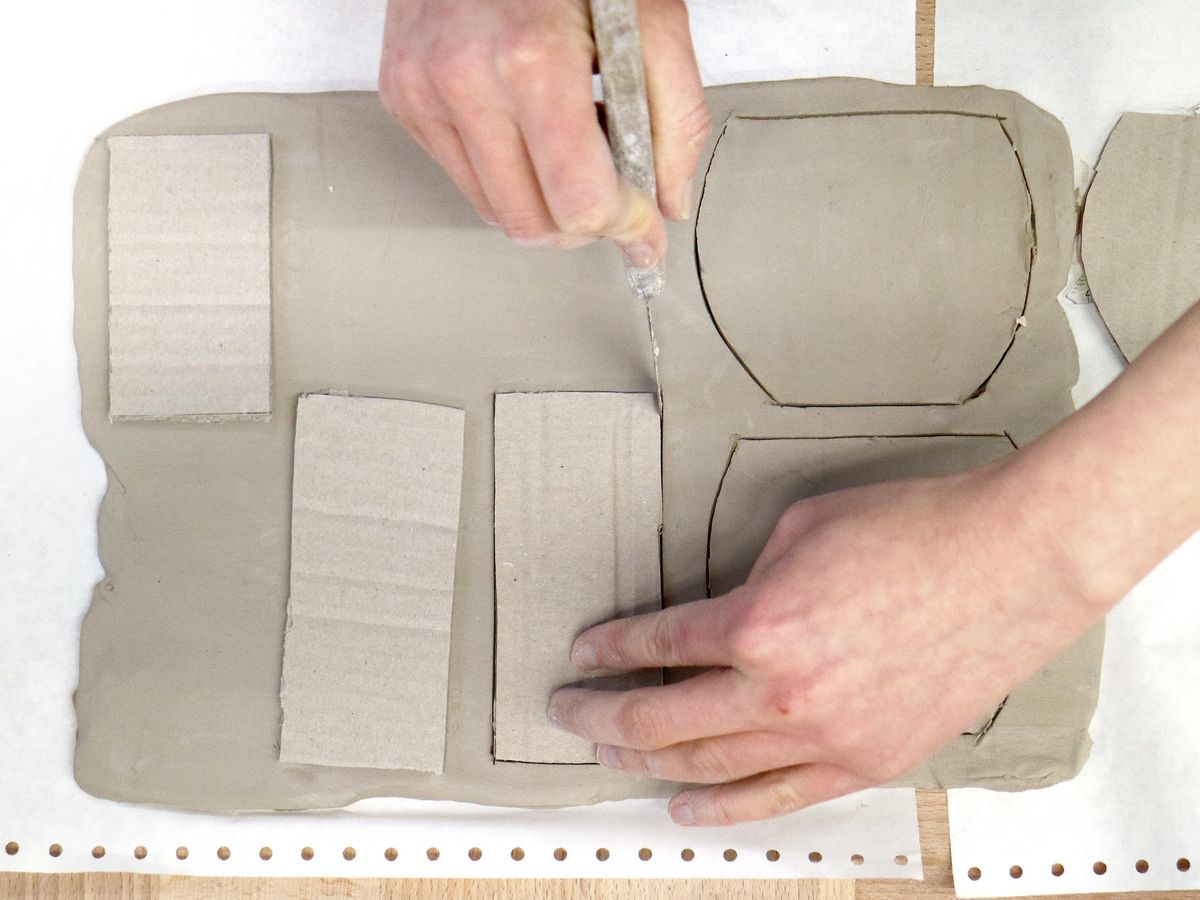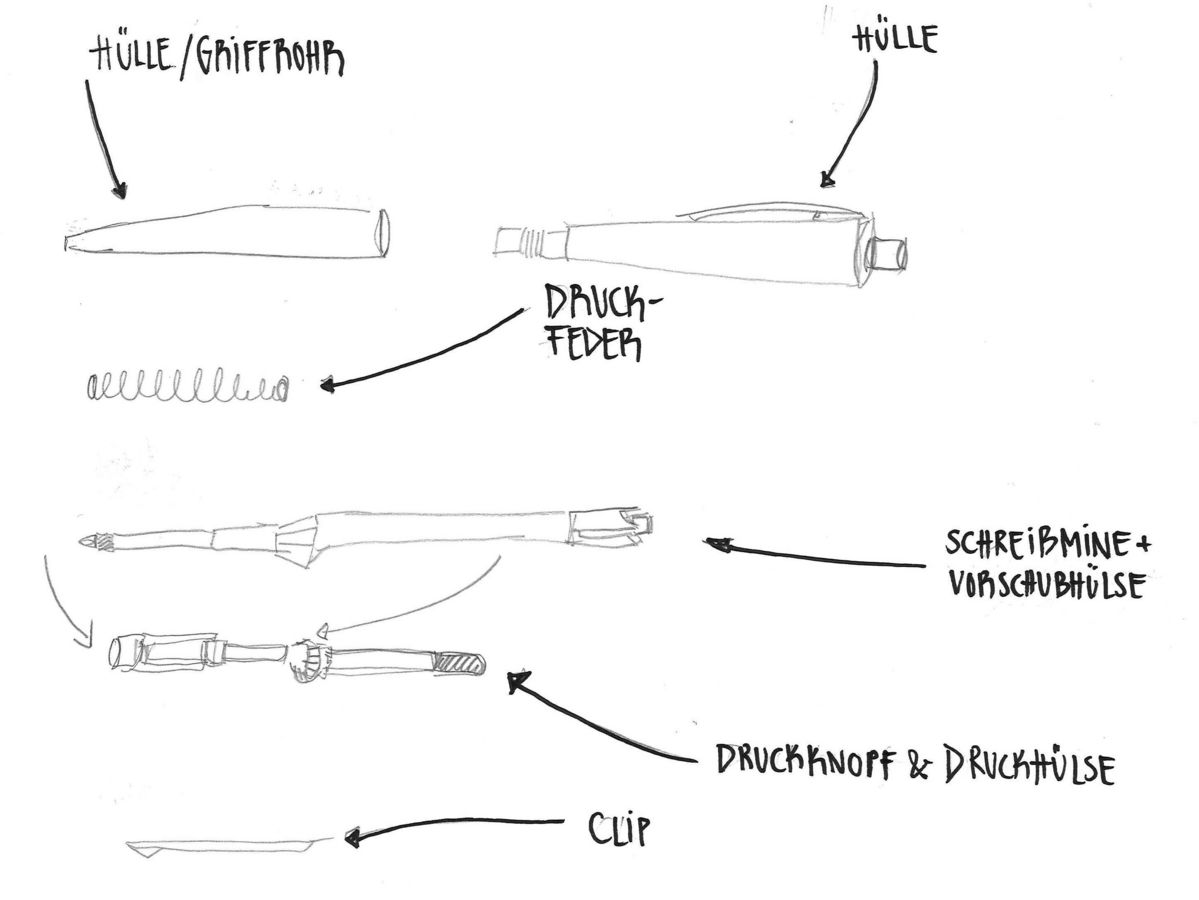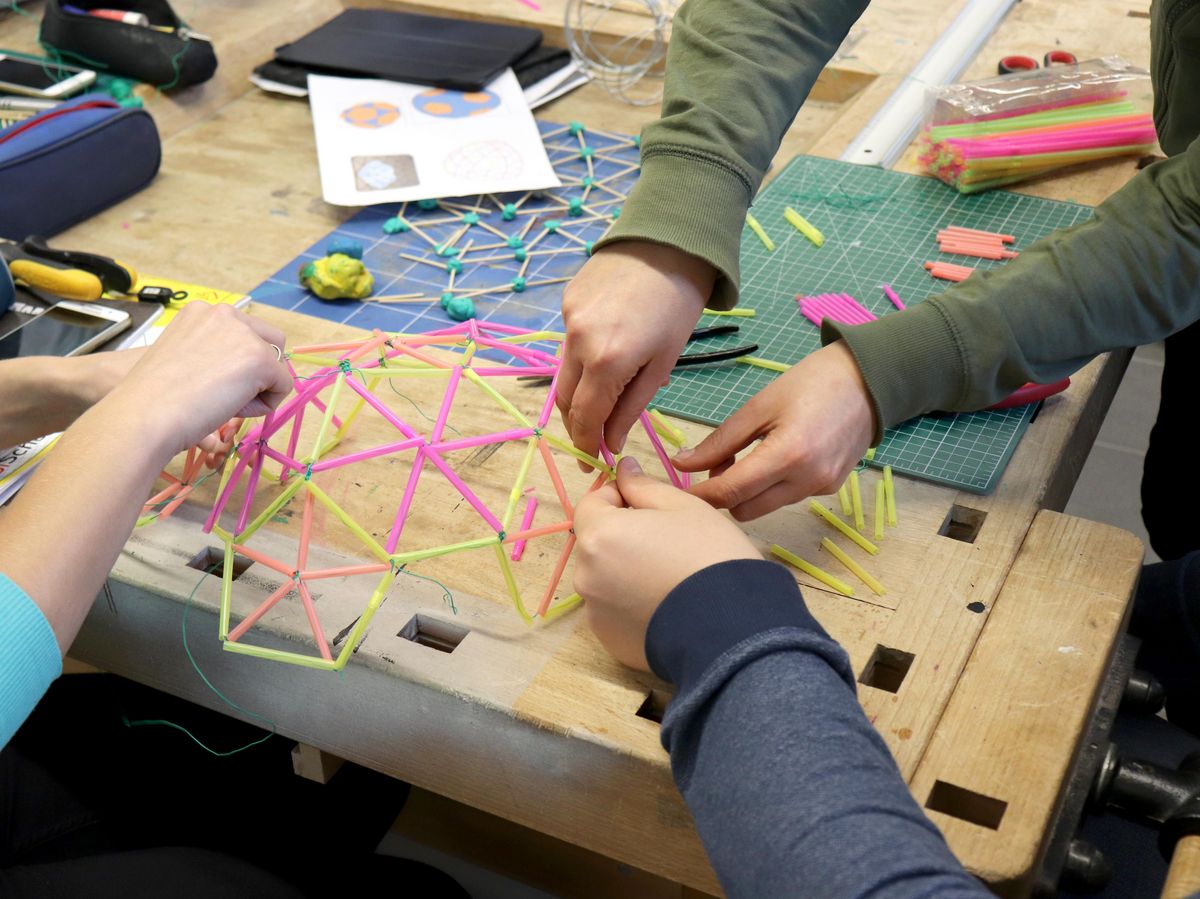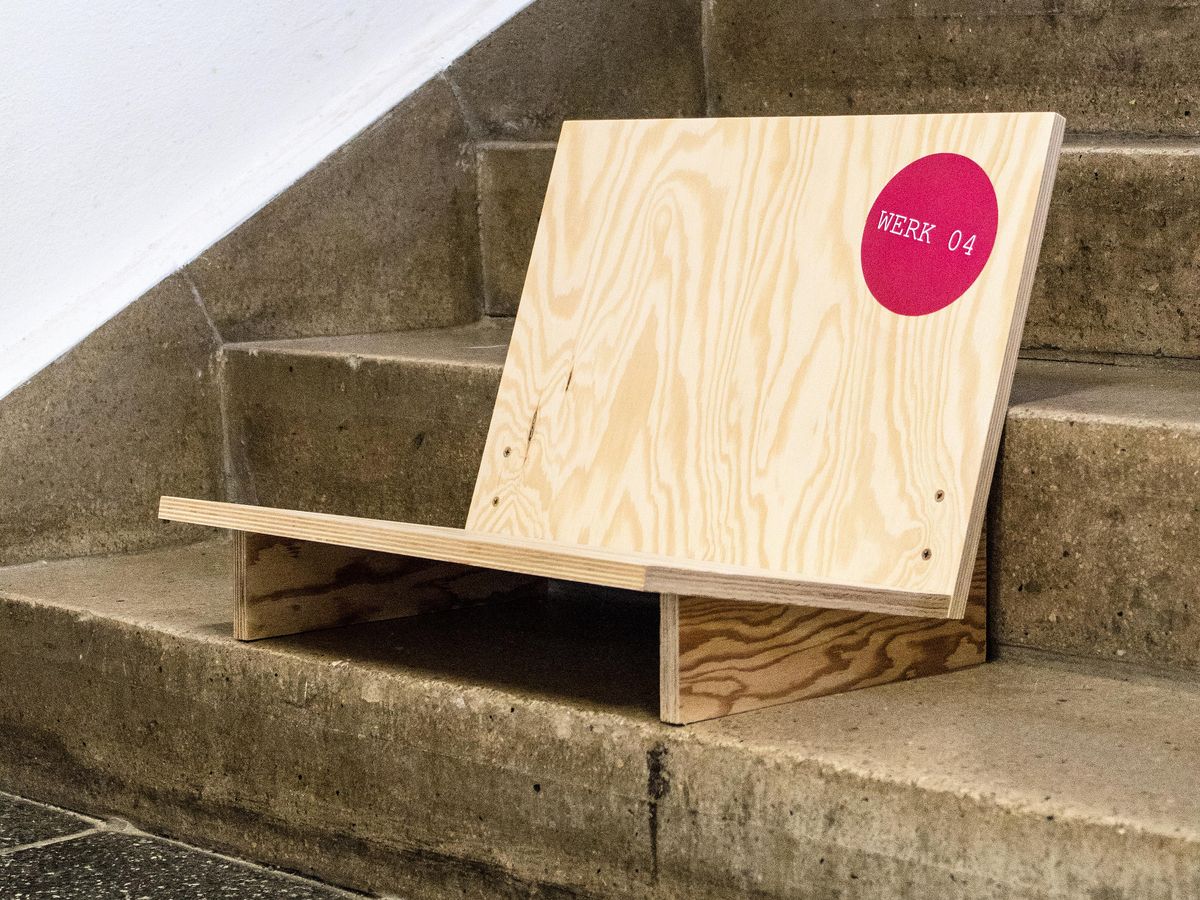The primary school didactics of handicrafts at the University of Leipzig brings together the three educational areas of handicrafts, technology and aesthetics with the aim of building up craft, aesthetic and technical literacy. On this page you will find a short introduction to the subject. In addition, you will find information about the modules for the teaching profession and the open workshop, and we will give you important information about the oral state examination.
Understanding of primary school didactics of works at the University of Leipzig
Children live in a rapidly changing technological world and a society decisively shaped by it. Living in a so-called technosphere and the associated degree of complexity make preparatory discussions and a responsible introduction in the sense of a general technical education necessary. At the same time, children currently often lack primary experiences in the form of creative and action-oriented craftsmanship with materials and production processes, in contrast to the increasingly strong emphasis on second-hand digital learning opportunities.
The subject didactics of crafts at the University of Leipzig brings together the three educational areas of crafts, technology and aesthetics with the aim of building up craft, aesthetic and technical literacy. On this basis, the guiding principle of research and design focuses on the penetration of technical facts and creative-technical problem solving. Students in the subject of handicrafts transfer subject-specific scientific and practical content to individual problem-solving processes in challenging technical and creative tasks and their own semester projects. On this basis, the students are enabled to design teaching-learning processes through the teaching of subject didactic competences, in which they develop learning environments for contemporary inclusive handicraft teaching.
Module descriptions
Here you will find information on the modules for the teaching profession at primary schools and the teaching profession in special needs education.
Fundamentals of the subject of works as technical design (compulsory module)
Recommended for: 2nd - 3rd semester
Responsible: Professorship for Didactics of Science Teaching in Primary School
Duration: two semesters
Module change: every summer semester
Teaching formats
• Seminar "Introduction to the subject of handicrafts as technical design" (2 SWS) = 30 h attendance time and 70 h self-study = 100 h
• Exercise "Fundamentals of Technical Design I" (2 SWS) = 30 h attendance time and 70 h self-study = 100 h
• Exercise "Fundamentals of Technical Design II" (2 SWS) = 30 h attendance time and 70 h self-study = 100 h workload 10 LP = 300 working hours (workload)
Applicability: Modularised State Examination for Primary School Teachers and Special Education Teachers
Goals
Seminar: Students develop a basic understanding of
- the conceptual-historical developments of the subject,
- the target dimensions of a basic education in the subject,
- dealing with diversity, individual learning backgrounds and life-world orientation in the subject.
Exercises: The students deepen their knowledge of the fundamentals of the subject with the practical use of materials relevant to primary school.
Content:
- Subject-specific scientific and didactic foundations of the subject of handicrafts
- Contents and target dimensions of basic education in the subject of handicrafts
- Contents and methods of basic craft-technical-aesthetic education
- Diversity, orientation to learning situations and lifeworld orientation in the subject
Participation requirements: none
Recommendation: Participation in the foundation course to acquire basic craft skills in the area of materials and subject areas relevant to primary school.
Award of credit points: The awarding of credit points is governed by the regulations laid down in the examination regulations for the degree programme "Primary School Teaching".
Examination: Practical examination with scientific analysis (processing time 4 weeks). Graded.
Modulbeschreibung WERK02
Subject didactics of technical design (compulsory module)
Recommended for: 4th semester
Responsible: Chair of Elementary Didactics of Technical Design
Duration: one semester
Module rotation: Summer semester
Teaching forms:
- Exercise 1 "Research and technical design in primary education" (2 SWS) = 30h attendance time and 45h self-study = 75h
- Exercise 2 "Development of learning environments for technical design in primary education" (2 SWS) = 30h attendance time and 45h self-study = 75h
Workload: 5 LP = 150 working hours (workload)
Applicability: Modularised state examination for primary school teachers
Goals:
- Exercise 1: The students develop a design, action and mediation competence in technical design.
- Exercise 2: Students acquire competences for teaching and learning in the subject of works taking diversity into account.
Content:
Occupational safety course: Handling of tools, equipment and machines in accordance with DGUV
Exercise 1: Research and design using
- design and manufacturing processes relevant to primary schools,
- the processing of selected problem-oriented work tasks,
- the experimental confrontation with objects of knowledge
- the development of artefacts
Exercise 2: Competency- and learning-condition-oriented lesson design in the subject of handicrafts by:
- Teaching subject didactic principles and specifics of learning environment design
- Transfer of theoretical knowledge in practical trials
Participation requirements: Module 1 completed
Award of credit points: The award of credit points is governed by the regulations laid down in the examination regulations for the degree programme "Primary School Teacher Training".
Examination results: Artefact with subject didactic analysis (processing time 4 weeks). Graded
Modul WERK03 (LA GS)
Deepening and networking in interdisciplinary fields of handicraft teaching in primary school (compulsory module)
Recommended for: 6th and 7th semester
Responsible: Primary didactics of handicrafts / Chair of primary didactics of subject teaching
Duration: two semesters
Module rotation: Summer semester and winter semester
Teaching forms:
- Seminar "Interdisciplinary Aspects of Work Instruction" (2 SWS) = 30 h attendance time and 70 h self-study = 100 h
- Seminar "Projects and project orientation with a view to differentiation and integration in work-based teaching" (4 SWS) = 60 h attendance time and 140 h self-study = 200 h
Workload: 10 LP = 300 working hours
Goals:
- Deepening insights into fundamental content-related focal points and didactic-methodical design possibilities for the realisation of handicraft lessons in primary school
- Acquiring competences of interdisciplinary and cross-curricular pedagogical action
- Knowledge of subject-specific methods to promote self-determined, independent and cooperative learning and working
- Recognise and apply differentiation and integration as principles of handicraft teaching
- Acquisition of competences in the planning and design of interdisciplinary teaching plans and projects
- Basic knowledge about the development of further interests in handicraft lessons
- In-depth knowledge of the contents, methods and objectives of exemplary content areas of handicraft lessons
- Master presentation techniques
Content:
- Basics of teaching and learning in handicraft lessons
- Interdisciplinary and project-oriented learning in handicraft lessons
- Objectives, contents and methods of selected learning areas
- Open, inclusive and cooperative lesson design in handicraft lessons
- Presentation of project results
Participation requirements: Module 1 and 2 completed
Examination: Project work (assessed)
Modul WERK 04 (LA SP)
Subject didactics of technical design taking into account project orientation and diversity (compulsory module)
Recommended for: 5th semester
Responsible: Professorship of Elementary Didactics of Teaching Science
Duration: two semesters
Module rotation: Winter semester
Teaching forms
Exercise 1: "Research and technical design in primary education" (2 SWS) = 30h attendance time and 45h self-study = 75h (5th semester)
Exercise 2: "Development of learning environments for technical design in primary education" (2 SWS) = 30h attendance time and 45h self-study = 75h (5th semester)
Exercise 3: "Project orientation with a view to diversity in technical design" (2 SWS) = 30 h attendance time and 45h self-study = 75h (6th semester)
Workload: 10 LP = 225 working hours
Applicability: Modularised state examination for special education teachers
Goals
Exercise 1: Students develop a design, action and mediation competence in technical design.
Exercise 2: The students acquire competences for teaching and learning in the subject of works, taking diversity into account.
Exercise 3: The students deepen their subject didactic competences by means of a selected project.
Content
Exercise 1: Research and design through
- design and manufacturing processes relevant to primary schools,
- the processing of selected problem-oriented work tasks,
- the experimental examination of objects of knowledge,
- he development of artefacts
Exercise 2: Competency- and learning-condition-oriented lesson design in the subject of handicrafts by:
- Teaching subject didactic principles and specifics of learning environment design
- Transfer of theoretical knowledge in practical trials
Exercise 3: Project orientation through:
- multidisciplinary problems
- the didactic transfer to the primary level
- an in-depth examination of design methodology and manufacturing techniques
- the exemplary application of problem-solving-oriented process models for technical design
Participation requirements: Module 1 completed
Award of credit points: The award of credit points is governed by the regulations laid down in the examination regulations for the degree programme "Primary School Teacher Training".
Examination achievements and prior examination achievements: Artefact with subject didactic analysis (processing time 4 weeks): Graded
Information on the oral state examination
- Brief opportunity to speak on the basis of the thesis paper
- then in-depth and further questions from the examiners >Discourse!
- Discussion situation means: being able to establish relationships between educational goals, methods, heterogeneous learning situations and societal challenges (differentiation, inclusion, aspects of the future...)
Please bear in mind that you may also be asked cross-cutting questions on other subject areas during the examination.
Extract from the Teacher Examination Regulations I, 29.August2012 (SächsGVBl. S.467) §26 Grundschuldidaktik
Scientific and practical basics of handicraft teaching in primary school
- Basics of handicraft teaching from a technical and design perspective
- Basics of a fact- and child-oriented approach to the planning and implementation of work processes
- Material- and technology-specific knowledge and skills
Subject didactic basics of handicraft teaching in primary school
Activity-oriented methods and technology-didactic competence development in subject-specific, interdisciplinary and cross-curricular application as well as in projects
- Aims and contents of the handicraft lessons in primary school
- Designing teaching-learning processes in works, taking into account an aesthetic, technical and craft-based approach to different materials
- multi-perspective synopsis of contemporary components of technology
- The use of presentation media is not permitted.
Bring materials only in moderation and only if they are absolutely necessary for the performance.
For all examinations there is a second examiner from the school practice or from the school authority.
At the latest 7 days before the examination date, papers must be handed in to the examiner (P.O. Box House III EG) or sent by e-mail: -
- a thesis paper
- a structured bibliography (subject science - subject didactics)
- In the examination, the thesis paper, which is also available to the examiners, may be used for orientation. Other aids (notes, index cards, etc.) are not permitted.
Prepare a short input on one focus from the field of subject science. Concretise and link this with two subject didactic focal points by means of 1-2 sub-theses. If necessary, draft a content outline (which you do not hand in!), which helps you to present your thesis in a structured way in the first part of the examination and to illuminate it controversially.
What is a thesis?
A thesis is an assertion that is the starting point of an argument.
The "truth content" must be able to be carried out (argued) through evidence and proof (e.g. empirical investigations, experiments, examples).
However, a thesis is always "true" because it is proven in the argumentation (unlike the hypothesis).
Nevertheless, it must also be possible to formulate a counter-thesis (counter-assertion) for every thesis (assertion).
The thesis should not be an evident judgement. The result is therefore not obvious and immediately apparent - that would be trivial! A thesis should be formulated as precisely as possible and kept as short as possible (usually one sentence).
Translated with www.DeepL.com/Translator (free version)
Thesis paper concrete:
Focus on subject-specific science (1)
- The concepts of technology, craftsmanship and aesthetics and their significance for primary school didactics Works
or:
- Aspects of the historical development of handicraft teaching with special consideration of the design pedagogical ideas and those of the Bauhaus as a source of impulses for contemporary handicraft teaching
or:
- Materials and their design-technical potential
or:
- cultural and socio-economic contexts with a special focus on sustainability.
Linkage subject didactics (2)
- Educational goals and educational effectiveness of the subject of handicrafts
- Acquisition of competences
- Methods and method adaptation for work processes
- Possibilities and justifications for finding themes for work processes/work tasks
- Phases and goals of different work processes
- Inclusion, heterogeneity and differentiation
Example of a thesis paper:
Name:
Matriculation:
Examination date:
Examiner:
Subject-specific focus:
- The concepts of technology, craft and design and their significance for the didactics of primary school work
Didactic theses:
- The technical and textile design lessons as a unity of thinking and doing, create space for competence and personality development, as well as the development of self-efficacy in the pupils.
- The work task is the basis of subject-specific learning in the current handicraft lessons and serves to promote problem-solving skills as well as action orientation by stimulating complex brain activities in the children.
Basic examination literature
BIRRI, C. & Kolleg*innen (2003): Lehrmittel Fachdidaktik Technisches Gestalten / Werken. Basel / St. Gallen
BAUER, D. & Kolleg*innen (2021): Forschen und Gestaten als Leitprinzip im Fach Werken. Perspektiven für eine zeitgemäße und
zukunftsorientierte Fachdidaktik. In: Müller, M. & Schuhmann, S. (Hrsg.): Technische Bildung. Stimmen aus Forschung. Lehre und Praxis.
Münster: Waxmann, S. 141-160
GAUS-HEGENER, E. (2007): Räume für neues Lehren und Lernen. In: Gaus-Hegener (Hrsg.): Gestaltungsräume schaffen. Bildungsort Werken und Textiles Gestalten. Pestalozzianum / Schneider Verlag Hohengehren
HÜTTNER, A. (2009, 3. AUFL.): Technik unterrichten. Methoden und Unterrichtsverfahren im Technikunterricht. Verlag Europa Lehrmittel: Hahn-Gruiten
JENSEN, H./ SOMAZZI, M. / WEBER, K. (Hrsg.) (2012): Handlungskompetenz im technischen und textilen Gestalten Beschreiben-Aufbauen-Einschätzen: Ein Kompetenzmodell für die Unterrichtspraxis. Bern: schulverlag plus
METTE, D. & Kolleg*innen (2006): Wissensspeicher Werkstoffbearbeitung. 2. Aufl. Berlin: Cornelsen, Berlin: Volk und Wissen.
KULA, D & TERNAUX, É (2013): Materiology. The Creative Industry's Guide to Materials and Technologies. Birkhäuser Verlag
STEINMANN, A. & MIKUTTA, A. (2020): Designpädagogik trifft technisches Gestalten im Primarbereich. Impulse für eine fachliche Neuorientierung. In: Park, J. (Hrsg.): Designwissenschaft trifft Bildungswissenschaft. München: Kopaed, S. 14-25
STUBER, T. (2016): Technik und Design. Grundlagen. Hep Bildungsverlag Bern
STUBER, T. & Kolleg*innen (2012, 6. Aufl.): Werkweiser 1 und 2 für technische und textiles Gestalten. Schuljahr. Bern: schulverlag, swch.ch
Werkspuren (Nr. 131/ 3/2013 - Guter Unterricht) – Fachzeitschrift zur Vermittlung von Design und Technik. Online unter: www.werkspuren.ch
Advanced exam literature
BIESTER, W. (HRSG.) (1996): Praktisches Lernen und technische Bildung in der Grundschule. Bestandaufnahme und Ausstattungsempfehlung. VDI
DREYER, A.( 2005). Kunstpädagogische Professionalität und Kunstdidaktik. München: kopaed
EHRMANN, W. & KOLLEG*INNEN(2015): Holztechnik – Gestaltung, Konstruktion, Arbeitsplanung. Europa-Lehrmittel Verlag Haan-Gruuiten
FIEDLER, J. & FEIERABEND,P. (Hrsg.): Das Bauhaus; H.F.Ullmann (2013)
FREY, K. (2012): Die Projektmethode: der Weg zum bildenden Tun. 12., neu ausgestattete Auflage. Weinheim; Basel: Beltz Verlag.
GROPIUS, W. (Hrsg.)(1955): 1919-Bauhaus-1928. Stuttgart, Gerd Hatje Verlag
HEIZ, V. (2012): Grundlagen der Gestaltung 1-4; Niggli, Zürich
HELLER, E. (2004): Wie Farben wirken; rowohlt
JARAUSCH. K. (2020): Kreativitätsstrategien. In: Werkspuren. Fachzeitschrift zur Vermittlung von Kunst und Design.4/.2020, Nr. 160; S.46-47
KNOLL, S./ SEIDLER, M. (2020) Analoge Bildwelten erschaffen und mit digitalen Medien zum Leben erwecken – Kinder produzieren Trickfilme. In: Landeskompetenzzentrum zur Sprachförderung an Kindertageseinrichtungen in Sachsen (Hrsg.): Dialogital – Analoge und digitale Medien in der frühen Bildung – Impulse, Praxis, Reflexionen. Tagungsbroschüre zum 8. Leipziger Frühjahrssymposium. Leipzig, 2020
KÖNIG, K. (2009): Technikgeschichte. Steiner Verlag: Stuttgart
LAMBERT, ANNETTE, REDDECK, PETRA (2007): Brücken - Türme - Häuser: statisch-konstruktives Bauen in der Grundschule
NOLL, T. (2010): Holzverbindungen. Das komplette Handbuch. 2. Aufl. Bern; Stuttgart; Wien: Haupt Verlag.
PAHL, J.-P. (2005): Ausbildungs- und Unterrichtsverfahren. Ein Kompendium für den Lernbereich Arbeit und Technik. Bielefeld: Bertelsmann Verlag
PETERSSEN, W. (HRSG.) (2000): Fächerverbindender Unterricht. Begriff, Konzept, Planung, Beispiele. München: Oldenburg Spielverlag
PILLAU, A. (2013): Was ist Design Thinking? Vom Designvorgang zum kreativen Problemlösungsprozess für Wirtschaft und Ausbildung. IN: Kunst und Unterricht. Heft 371-372. Friedrich Verlag, 70-74
REUTER, O. (2007): Experimentieren: Ästhetisches Verhalten von Grundschulkindern, kopaed
STEINMANN, A. / SEIDLER, M. (2020): Technische Primardidaktik. Vielfalt produktiv begegnen. In: Werkspuren. Zeitschrift für Technik und Design. Heft 3 / 2020. SWV Design und Technik: Zürich, 2020; S. 52-53
STEINMANN, A.(2021): Diversität in technischen Lernsettings des Primarbereichs.
Herausfordernden Lernaufgaben produktiv begegnen. In: Müller, M. & Schuhmann, S. (Hrsg.): Technische Bildung. Stimmen aus Forschung. Lehre und Praxis. Münster: Waxmann, S. 141-160
SÄCHSISCHES STAATSMINISTERIUM FÜR KULTUS (Hrsg.) (2004/2009): Lehrplan Grundschule – Werken. Überarbeitete Fassung 2009.
SCHMAYL, W. / WILKENING, F. (1995): Technikunterricht, Bad Heilbrunn: Klinkhardt
SCHMAYL, W. (2010): Didaktik allgemeinbildenden Technikunterrichts. Baltmannsweiler: Schneider Verlag Hohengehren
Werkspuren – Fachzeitschrift zur Vermittlung von Design und Technik. Online unter: www.werkspuren.ch
Open workshop
The open workshop of the primary school didactics of crafts follows the idea of technical design and offers the opportunity to deepen subject-specific practical projects within the framework of the practice and seminar context of the individual modules (and beyond). In addition to an open workshop with the use and application of a variety of materials, tools and processes, workshops are held regularly that address specific subject didactic topics and enable practical testing/ further training. The open workshop is located in House 3 in room -121. The contact person is Torsten Claus (workshop foreman in the GSD Werken department).
Learn more
